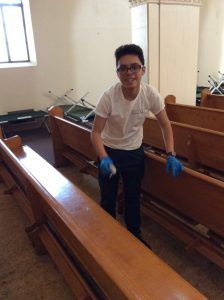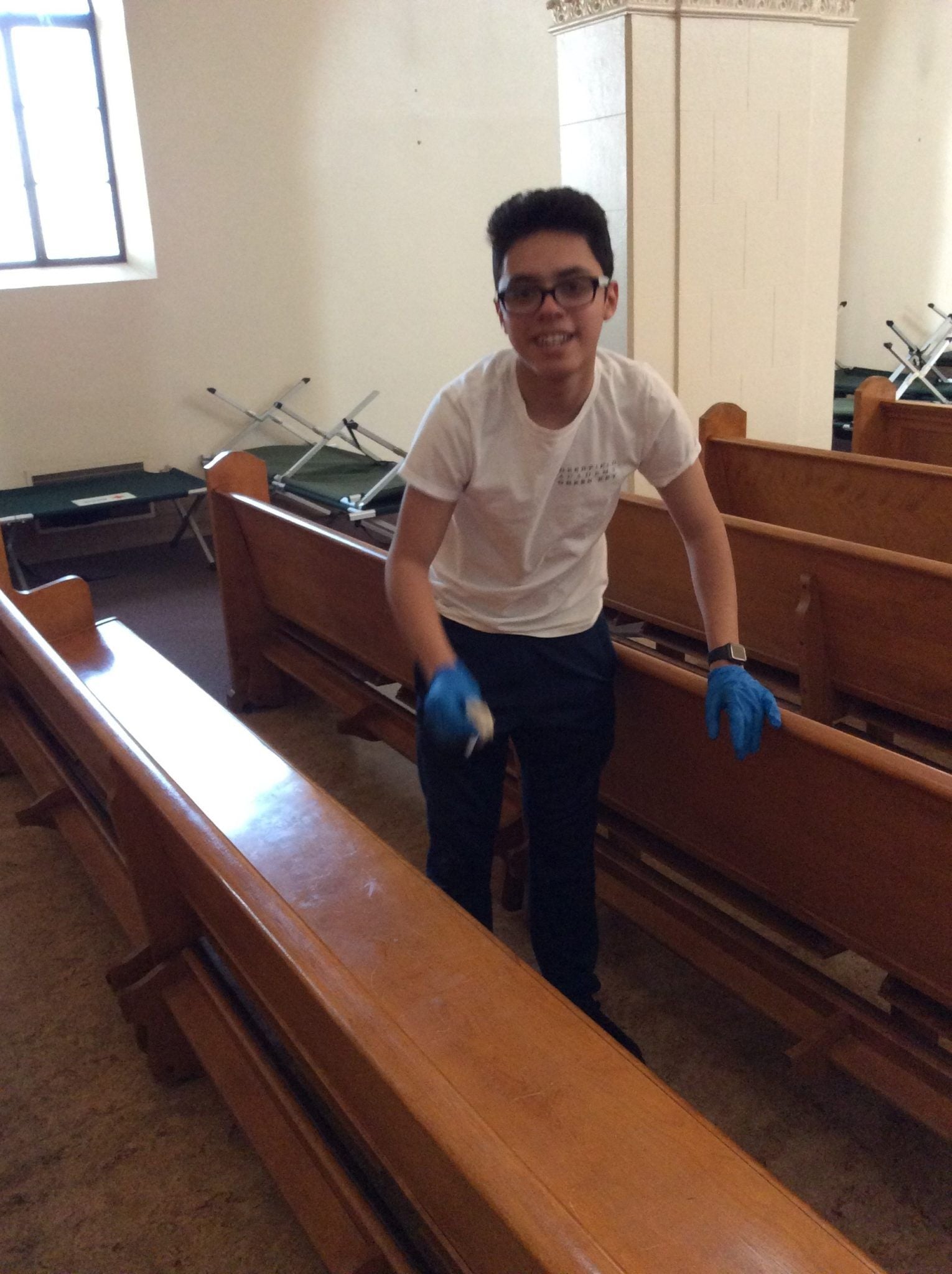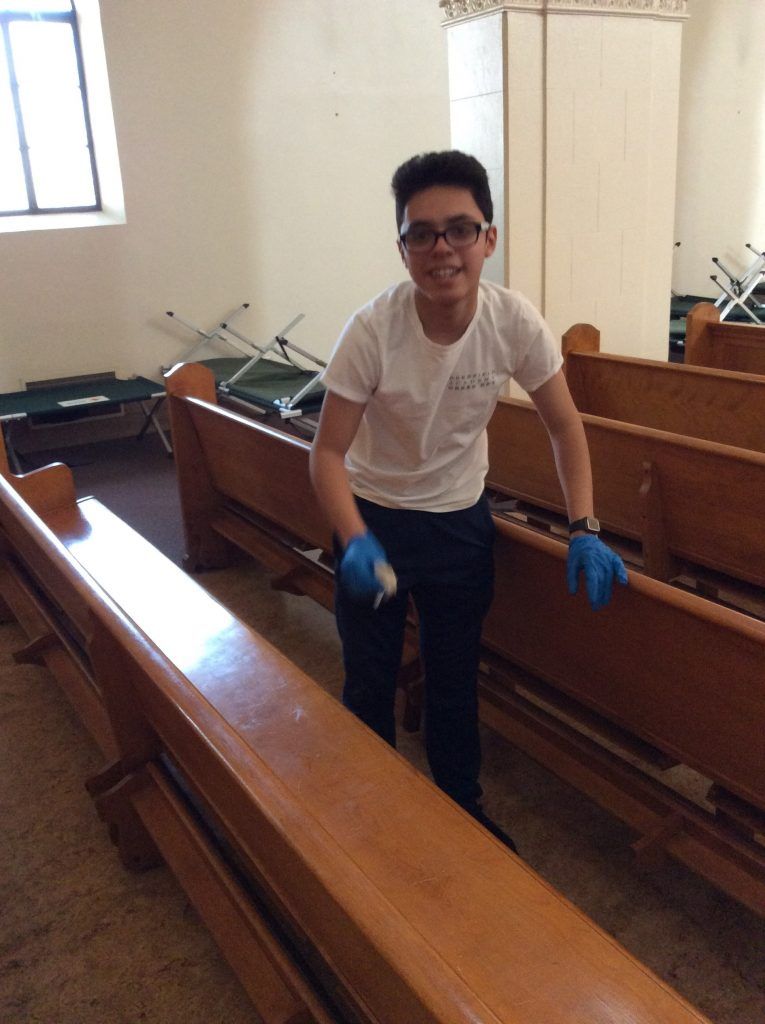Alexander Bautista (’21) describes his volunteer work cleaning and translating at the Benedictine Monastery, a place that offers shelter and resources for immigrant families.
Today, we were given the opportunity to go to a Benedictine Monastery in Tucson, Arizona. This monastery once housed nuns. However, as the nuns aged and slowly left the monastery it became desolate. The area where the Benedictine Monastery is located is a hotspot for asylum-seeking immigrants who are crossing the southern border. Their first action as they enter the U.S legally is they turn themselves in to the Border Patrol and tell them they are seeking asylum. The border patrol takes the immigrants to detention centers in order to be processed. The amount of time this process takes varies depending upon the detention center. It is important to note that these detention centers are not pleasant places. Some immigrants are provided only crackers and water to eat and drink. If they are lucky, they have enough room to sleep comfortably. Unfortunately for many asylum-seeking immigrants, they don’t get that privilege. Following their Border Patrol processing the people in question are able to leave. However, where are they supposed to go? Sometimes they are dropped off at a bus stop and left all by themselves. Remember, these are people who have never been to the United States and they have no idea how life works or how to get to their destination. They often do not speak English. This is where the Benedictine Monastery comes in. This monastery was transformed into a shelter for immigrants so they have somewhere to stay following their release from the detention center. The Benedictine Monastery welcomes the families and provides them all the basic necessities like food, water, and shelter. They also allow them to call their families, and provide what is needed to make the trip to the next destination. This could be to a family member who lives in another state, or to someone who has sponsored them. The Benedictine Monastery does their best to assure that their transition from their home country to their final destination in the States is as painless as possible.
Our group went to the Benedictine Monastery to volunteer for a couple of hours. We cleaned cots and pews because they have to be disinfected so families don’t get sick. We also sorted sheets, blankets, and articles of clothing so that they can be washed. We basically did whatever the employees needed us to do to make the room ready for a new batch of arrivals.
Finally, Xochitl and I were given the opportunity to translate for the medical examiners. When the asylum-seekers arrive at the monastery they go through an orientation. This orientation includes learning about life in United States, the rules one must follow when in the monastery, and what their next steps are after leaving the monastery. Following the orientation, medical examiners come to check on the immigrants. They gather basic information, make sure they have all their papers, and check their health. Since the doctors that came knew very little English, they needed translators. Xochitl and I volunteered. Because of this, we were able to learn more about their stories coming into the United States and their interactions with the Border Patrol. The family that I met was from Guatemala. There were three kids, the mother, and the father. They had travelled for six days until they arrived at a southern port. They were detained by Border Patrol and brought to a detention center. During their time in the detention center, the littlest one, Genesis, got sick. She started having a fever and an upset stomach. The mom had packed formula, but the border patrol officer threw it away and gave her a different formula. The problem was that the baby didn’t like the new formula. She threw up when they tried feeding her. She also didn’t like the peanut butter crackers that were offered, so Genesis ate nothing for those four days. All she had had was water. As the days went by she started getting sicker and some of the other children weren’t feeling too well either. Finally, they were released and sent to the Benedictine Monastery. By the time they arrived, they were malnourished and their three kids weren’t feeling well. Honestly, I couldn’t believe what I had heard. This family has been through so much and their first experience with authority was a terrible one. They didn’t deserve all that they went through. No one does.
Overall, volunteering at the Benedictine Monastery taught me a lot about the circumstances that immigrants go through just to get to America. Not only do they have to travel through numerous countries with barely anyone to help them, once they get here they are treated as criminals. Whether you agree with the current administration’s policies or not, you have to respect the resilience that these immigrants have. I know I have the upmost respect for these people who sacrifice everything just to have a chance to enter the United States.


